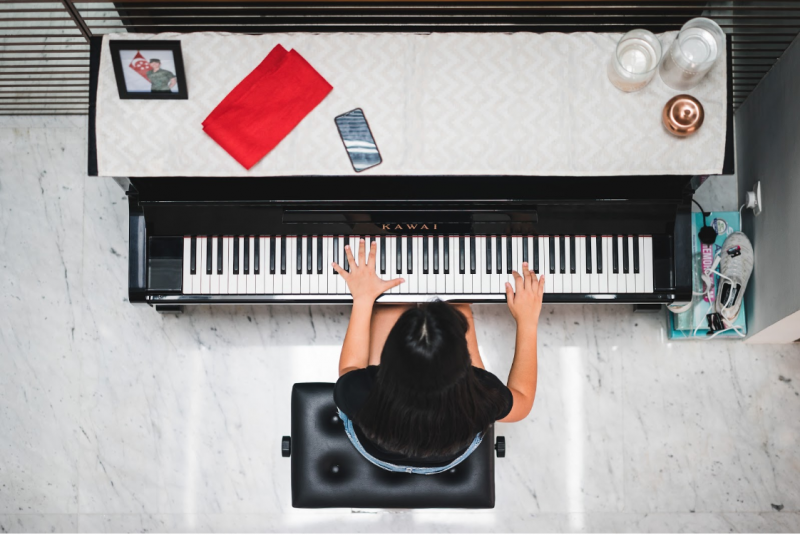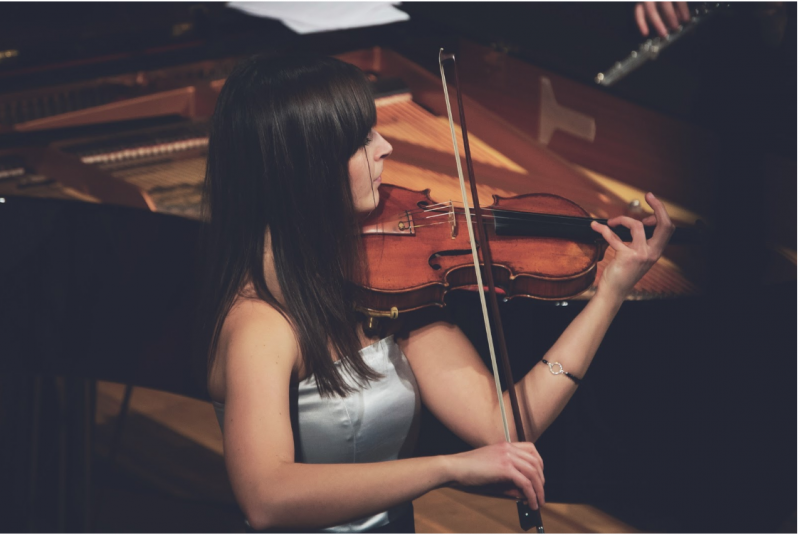“I enjoy reading about the lives of musicians, and find many similarities in their ideas of preparation and their utter devotion to this great eternal language: music.”
– Jessye Norman, Opera Singer

‘Tis the season of performing! Students around our studio are preparing pieces for upcoming events like exams, festivals, showcases, coffee house nights, and our spring recital! Previously, we have written on the subject of “the benefit of performing”. Performing allows students to set goals, conquer challenges, and grow exponentially as musicians. While all of this remains true, there is a huge part of the performance aspect that we haven’t delved into: PREPARATION.
Preparing for an upcoming performance can be daunting, both for the student and for the parent or family member who is dedicated to helping them! Preparation is perhaps the most important part of performing, as it is the determining factor for how successful the performance itself will be. Here is our list of the four best strategies that students (and parents) can use to ensure they are fully prepared, practiced and ready for “the big day”!
- Set key goals for your piece, your practice and your performance.
Set specific and achievable goals for yourself regarding your piece starting with where you will perform! Perhaps the piece will be presented at an exam, possibly the Sherwood Park Music Festival or our Crescendo Coffee House Night. Once you know where and when you will be performing, you can start setting goals relating to your practice!
Draw out a specific timeline… pick a date that you will learn each section by, and a specific date you will have the song memorized by. Divide up your music according to the number of weeks you have until your performance. Set small specific goals that are achievable, and don’t be afraid to write on your music! Use a pencil, of course. Break your music into specific sections (pick ‘breakpoints’ that make musical sense!) draw a line marking what part of the music you want to have mastered, and write the deadline date. We ask parents to participate in this process to help the student achieve their goals.
Next, set some specific practice goals. Choose a realistic goal that aligns with your schedule. Perhaps you can practice four times a week for thirty minutes – set the goal, post it in an obvious place and stick to it! Parents, be a cheerleader for your child as they strive toward their goals and also when they achieve each goal. Help students by discussing a practice routine and schedule…create something you can BOTH agree on, and then help them maintain consistency. Also, listen to your child’s practice whenever possible. Ask them questions about their pieces like:
- What do you enjoy about this piece?
- What is your favourite part and why?
- What is the story behind the piece?
Showing genuine interest and engagement in your child’s music-learning journey is the most beneficial thing you can do to encourage a love of music in your home, resulting in consistent practice routines and overall growth.
Lastly, ensure that your child is practicing deliberately. Read through the lesson plan your teacher has provided. Is your child playing the songs that they are supposed to be playing? Are they paying attention to the details in the lesson plan? Are they practicing the specific parts asked of them, or only playing the full song from the beginning? Are they working on the scale that was assigned and are they completing their theory homework?
At Crescendo, we provide a lesson plan for each lesson with the hope that this will be a tool to help you as the parent, understand what is being worked on, even if you don’t know music! Reading through this with your child will not only keep you informed of what is expected of them but as your child grows and becomes an independent practicer you will have taught them to read their practice plans first! This ensures they are practicing deliberately by practicing the right things.
- Take the time to warm up every time you practice!
At every music lesson you attend at Crescendo, you will start by warming up! Begin your practice time by playing (or singing) a few scales or triads. Get your hands and fingers warm and muscles limber! If you are a vocalist, use recordings or warm-ups your teacher has shown you… never begin singing without a warm-up as inadequate preparation and warming up can damage your voice!
Warm-ups allow us to be prepared to perform our piece to the best of our ability. Also, be sure to warm up BEFORE your performance. Take a few minutes to yourself to run through some exercises and your performance piece before you go into any performance. Parents, your children may need a reminder on the day of their performance to do this very important step! For vocalists, it may be as simple taking a few moments in the car before the performance. Also, all instrumentalists should have good physical warm-ups (and breathing warm-ups) that they make part of their routine!
- Communicate with your child and their teacher!
One of the best things you can do for your child is to talk openly and regularly with their teacher. Make sure everyone is on the same page regarding the students’ goals, progress, and upcoming performances. Generally, your teacher will come out a few minutes early and discuss the lesson specific goals with you if you are available; however, if you can’t meet with the teacher after the lesson, then be sure to join the teacher and student in their lesson every few weeks. Be sure to go through the lesson plan with your child and get your child to explain what it is the teacher is asking of them. Students will often forget specifics if you wait too long, so if you do this step after the lesson it will be fresh in their brains!
When it comes to performances, ask the teacher their opinion. Why are they recommending these performances? Confirm all dates and discuss the song choice with your child. Most importantly, whenever possible try to be present for your child’s performance. Sometimes commitments and other engagements get in the way and that is okay, life is busy. However, as we said previously, the best thing a parent can do to ensure their child is engaged in their music learning journey is to be invested. Ask questions, show up to performances, discuss their repertoire. What are your favourite songs and why? Tell your child about these things! Perhaps they like the same songs as you, or maybe they haven’t thought about those pieces with your opinion before.
- Be ready for the “performance nerves” and learn how to combat them!
It’s understandable when students get stage fright…every performer will experience this. Being nervous to perform in front of an audience is a natural and common fear! In fact, most adults often declare that they could never get up and perform the way children do. Parents, if this describes you, be sure you mention this to your child and how amazing it is to you, that they can put aside their nerves and perform for an audience! This is a truly inspiring feat, and many students don’t realize what a significant accomplishment performing truly is!
To help students combat stage fright, teachers may use a variety of techniques. Try telling your child to imagine all the butterflies they may feel in their stomach flying all in one direction… this works well for students who are young, to help visualize this and center themselves. For older students, you may try to get them to imagine the performance they are going to put on. What will the stage look like? How will they sit on the bench, or hold the mic? What should they do when they get on stage, and before they step off? Tell them to imagine the full performance from beginning to end successfully; focusing on the fact that they are playing the difficult parts with no problems…and finally, visualizing the audience applause! This type of focus will train the brain to expect positivity, which can definitely help combat nerves.
Still, you may watch your child struggle to put away their stage fright, and sometimes that might even mean a student will cancel their performance. While it may feel as though they have wasted weeks of practice when this happens, it’s integral to remember that even without a performance they have still learned and mastered a piece, which is something to be proud of. You might encourage them to perform for “the video camera” instead! It is also very important to remind the student who may have performed and made a few mistakes that they should still be very proud of themselves; not every performance will be perfect, but the more you perform, the easier it gets! Just the accomplishment of getting on the stage is one to be celebrated!
Performing is a wonderful way to grow as a musician!
Here at Crescendo Music Studios, we encourage our teachers and students alike to participate in performance opportunities! It’s a wonderful way to set goals as a musician and continue to grow in your music learning journey. If you’d like to read our article about Why Performing Is Important For Musicians you can click here.

Sources:
5 ways to nail your next music performance. (n.d.). Retrieved from https://www.uncsa.edu/news/20161122-5-ways-to-nail-your-next-music-performance.aspx
How to Motivate Kids to Practice Hard Things. (2020). Retrieved 27 February 2020, from https://greatergood.berkeley.edu/article/item/how_to_motivate_kids_to_practice_hard_things
Klickstein, G. (2020, February 27). The 5 Facets of Performance Preparation. Retrieved from https://www.musiciansway.com/blog/2011/10/the-5-facets-of-performance-preparation/
(n.d.). Retrieved from https://www.marthabeth.com/helping_kids_practice.html